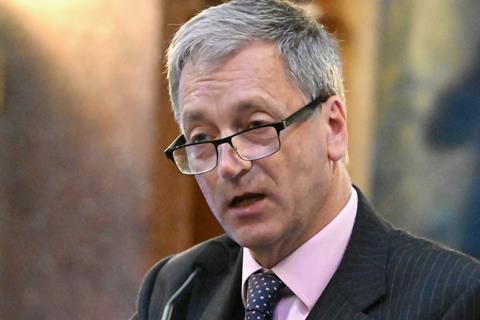Lawyers have unanimously welcomed a judge-led review on the criminal courts to cut the Crown court backlog, which has now reached a record high of 73,105 – however, opinion is divided on whether one option that Sir Brian Leveson has been asked to consider, which would limit jury trials, is the right answer.
Former Queen’s Bench Division president Sir Brian Leveson has been tasked with conducting the ‘once in a generation’ review and will present lord chancellor Shabana Mahmood with initial recommendations in the spring.
Leveson will explore the possibility of ‘intermediate courts’, where cases too serious for magistrates’ courts but not serious enough for the Crown court will be heard by a judge flanked by two magistrates.
However, Law Society president Richard Atkinson said he is not convinced that intermediate courts are the answer.
Atkinson said: ‘Removing appeal rights and eroding the fundamental right of jury trial by your peers for serious offences are major constitutional changes which require careful consideration. Nor are we convinced that intermediate courts are the silver bullet to solve the backlogs. They will take considerable time and resource to introduce and may severely impact other parts of the system. If there are the personnel, physical and financial resources available we think they may be better of being invested in the existing court structure immediately.’
Read more
Sir Brian Leveson to conduct criminal courts review after case backlog reaches record high
Atkinson said the Crown courts deal with only around 5% of all criminal cases ‘and this measure would not address the rapidly increasing backlog in the magistrates’ courts where most cases take place’.

Introducing intermediate courts, said Kingsley Napley’s Matthew Hardcastle, is ‘akin to spending time and energy designing a new ship while the current vessel is sinking. It offers a way forward, but it is of little use if the holes in the hull mean that you are sunk before the new ship is seaworthy’.
However, Clyde & Co’s Charles Kuhn, formerly with the Financial Conduct Authority’s enforcement and financial crime division, believes ‘intermediate courts’ as a solution to cutting the backlog is overdue.
Kuhn said: ‘Jury trials, while a historic element of the justice system, are significantly more expensive and more time-consuming compared to other countries. We estimate it to be 5-17 times more expensive and taking 2-3 times as long as in Germany. Adopting a hybrid model where certain cases are handled by judges and magistrates could be a realistic way to alleviate these pressures without compromising justice.’
Noting that magistrates deal with over 90% of criminal cases, Magistrates’ Association chief Mark Beattie said ‘intermediate courts’ were a sensible idea.
This article is now closed for comment.



























18 Readers' comments